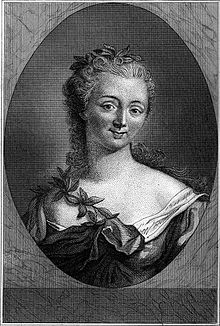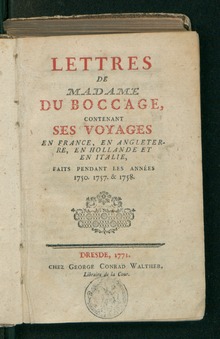Anne-Marie du Boccage
Anne-Marie du Boccage | |
|---|---|
 | |
| Born | Anne-Marie Fiquet Le Page 22 October 1710 |
| Died | 8 August 1802 (aged 91) Paris |
| Occupation(s) | Writer Playwright |
Anne-Marie Fiquet du Boccage, née Le Page, (22 October 1710 – 8 August 1802) was an 18th-century French writer, poet, and playwright.

Life
Born in Rouen into the upper middle-class, she was educated in a convent in Paris. Anne-Marie Du Boccage wrote letters, poems, and plays for the stage.
In 1727, she married Pierre-Joseph Fiquet du Boccage, a 'receveur des tailles' (tax collector) and literature enthusiast. The couple knew and associated with all the literary figures of Rouen: Le Cornier de Cideville, the abbé du Resnel, Elie de Beaumont (who was to be the lawyer in the case of the Calas affair), Jeanne-Marie Leprince de Beaumont, the abbé Yart, etc.
Having settled in Paris in 1733, the Du Boccages began to establish a
.In February 1748, she published a translation in six cantos of Milton's Paradise Lost, which she dedicated to the Rouen Academy. Voltaire and Fontenelle sang her praises, and the abbé de Bernis wrote some verse in her honour. Through this poem, she gained the public's interest and sudden fame. From the end of the 1740s until the 1760s, innumerable poems about her were published in the Mercure de France journal.
Encouraged by the success of her Paradis terrestre (Earthly paradise), Anne-Marie du Boccage decided to brave the stage with Les Amazones (The Amazons), a tragedy in verse. This was to some an unforgivable act of daring for a woman. In spite of the hostility of the public, she dug her heels in, falling ill on the eve of the premiere at the Comédie-Française on 24 July 1749, however the play was a success. Charles Collé reported that there was a full house, as if at a performance of a play by Voltaire or Crébillon in the depths of winter — although he did attribute the play to du Resnel or to Linant. Others, such as the abbé Raynal, or Baculard d'Arnaud, also blamed her for daring to tread on ground commonly occupied by male playwrights. Les Amazones was nevertheless performed eleven times, which was a success at a time when plays often fell by the wayside after a single performance.
Anne-Marie du Boccage then tried her hand at an epic poem with La Colombiade, a poem in ten cantos, which caused a stir in literary circles. Voltaire, Fréron, the Mercure de France, the Journal des savants and the Journal de Trévoux all praised it highly. It went through three editions in Paris, and was translated into English, Spanish, German and Italian.
Du Boccage's Lettres sur l'Angleterre, la Hollande et l'Italie (Letters Concerning England, Holland, and Italy, published in English in 1770 - volume 1,[1] volume 2[2]).
Anne-Marie du Boccage more literary prizes than any other woman of her time. After the
Anne-Marie du Boccage manifested a certain feminism and did not hesitate to support other women writers or artists.
Works
- Lettres sur l'Angleterre et la Hollande
- La Colombiade
- Le Paradis terrestre
- Les Amazones
- Le Temple de la Renommée
- Oraison Funèbre de François Eugène, Prince de Savoye (traduction)
- Lettres sur l'Angleterre, la Hollande et l'Italie
- Recueil des œuvres de Madame du Boccage volume 1 ; volume 2 ; volume 3
References
- ^ du Boccage, Anne-Marie (1770). "Letters Concerning England, Holland and Italy".
- ^ du Boccage, Anne-Marie (1770). "Letters Concerning England, Holland and Italy".
Bibliography
- Grace Gill-Mark, Une femme de lettres au XVIIIe siècle, Anne-Marie Du Boccage, Paris, Champion, 1927.
- Rotraud Von Kulessa, Les Amazones de Madame du Bocage dans la traduction italienne de Luisa Bergalli Gozzi, p. 255-267 in La Traduction du discours amoureux (1660–1830), colloque international (18-19 mars 2005), ed. Annie Cointre, Florence Lautel and Annie Rivara, Centre d'étude des textes et traductions, Université Paul Verlaine, Metz, 2006.
- Charlotte Simonin, 'Les feux purs d'Adam et Eve ou la traduction de la sexualité du Paradise Lost de Milton (1667) dans Le Paradis Terrestre de Marie-Anne du Boccage (1748)', p. 323-345 in La Traduction du discours amoureux (1660–1830), colloque international (18-19 mars 2005), ed. Annie Cointre, Florence Lautel et Annie Rivara, Centre d'étude des textes et traductions, Université Paul Verlaine, Metz, 2006.
